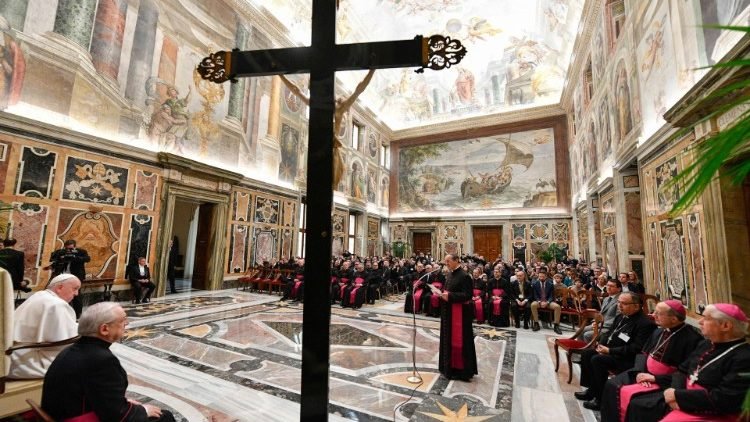Pope Francis meets with participants in a formation course organized by the Roman Rota, and highlights the important link between pastoral care and canon law.
By Devin Watkins
Greeting students in a course organized by the Roman Rota, Pope Francis recalled the relationship between the Church’s evangelizing mission and Church law.
In his address on Saturday, the Pope said that canon law cannot exist without evangelization and evangelization cannot be carried out without canon law, since the heart of canon law has to do with the “goods of communion, especially the Word of God and the Sacraments.”
“Every person and community,” he added, “has the right to encounter Christ, and all norms and juridical acts are aimed at promoting the authenticity and fecundity of that encounter.”
“Church law is therefore intimately connected to the life of the Church, as one of her necessary aspects, which is justice in conserving and transmitting the goods of salvation.”
Law is condition of love
Pope Francis went on to urge the law students to “love canon law” since “law is the condition of love”, in the words of the late Pope Benedict XVI.
Even though canonists work primarily with norms, trials, and sanctions, they are called never to forget people’s rights and so must put “people at the center of their work.”
[ These rights are never arbitrary pretexts, but rather objective goods ordered toward salvation, which must be recognized and protected, without forgetting the respect for natural goods inherent in the Church community. ]In other words, said the Pope, canon lawyers must “highlight the truth of justice in the life of the particular Churches, a task which greatly contributes to evangelization.”
Canonists, he continued, are called to discern the “concrete good” as they deal with each single case, without overlooking the common good inherent in the law.
Synodal journey in canon law
The Pope then considered the connection between canon law and the synodality of the Church.
“The synodal spirit must be lived in every aspect of your juridical duties. Journeying together in reciprocal listening while invoking the Holy Spirit is an indispensable condition for being just.”
He urged canonists always to ask the opinion of their more experienced colleagues in a spirit of humility in order to learn how to better serve the Church.
Tribunals and family pastoral care
Pope Francis also reflected on the link between pastoral care of families and Church tribunals.
“An integral pastoral care of families cannot ignore the juridical questions related to marriage,” he said, offering the example of null marriages or those which are not consummated.
In both cases, said the Pope, canonists can never forget that they are dealing with questions with an important pastoral element.
“The requirements of truth, accessibility, and prudent swiftness must always guide your work,” he said, “while we must not overlook the duty to do everything possible to reconcile couples or convalidate their union.”
‘Mirror of Justice’
In conclusion, Pope Francis encouraged students of canon law to continue their research for true goodness in the Word of God.
And he entrusted them and their work to “Our Lady, Mirror of Justice”.



